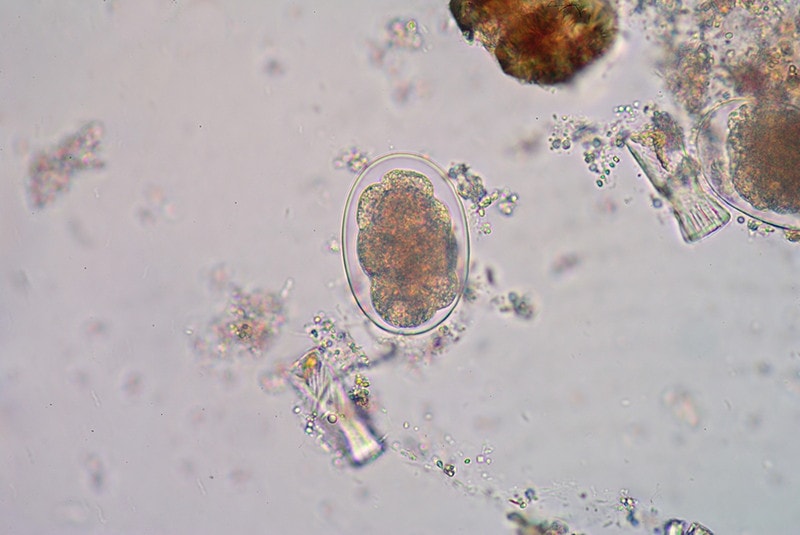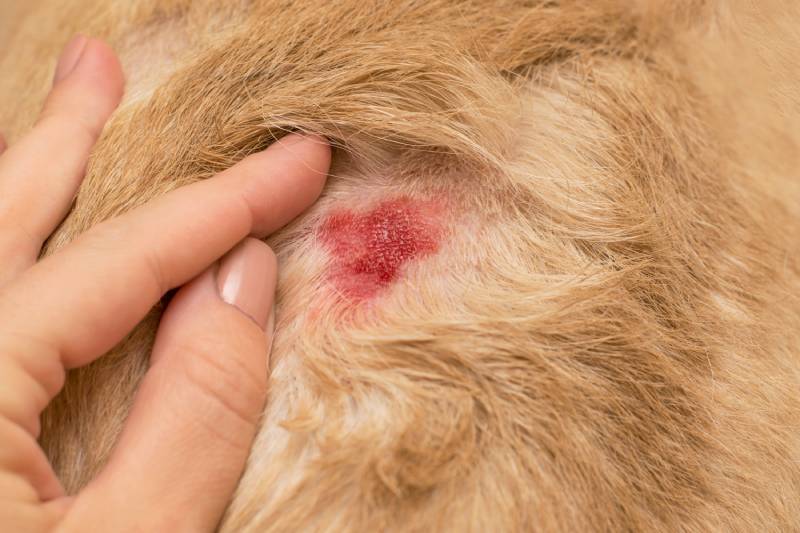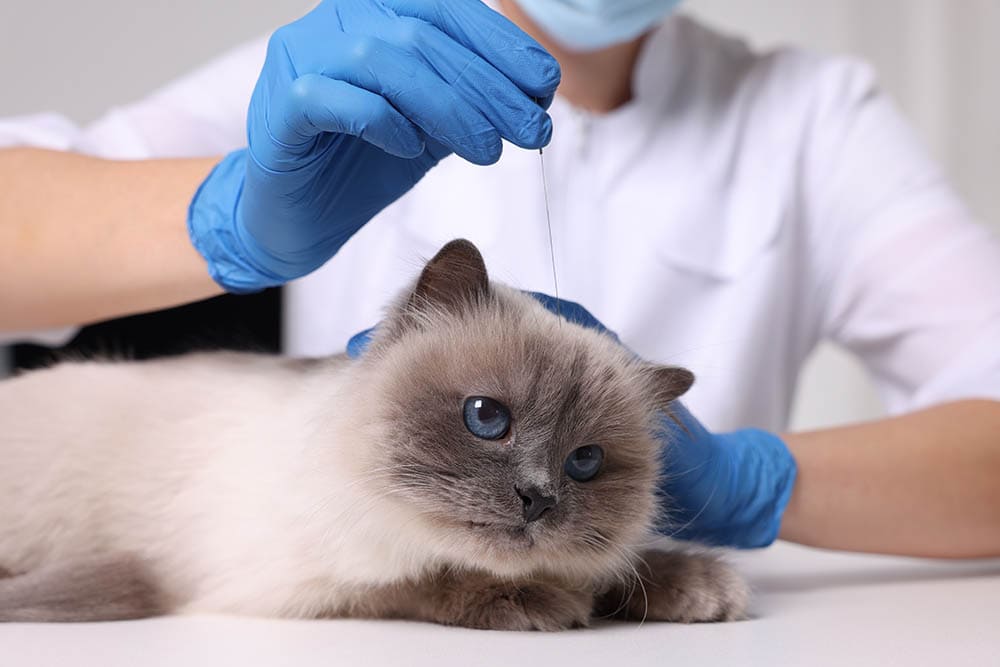Hookworms in Dogs: Our Vet Explains Signs, Causes, & Treatment
By Dr. Kim Podlecki, DVM (Vet)
Updated on

Hookworms are a type of intestinal parasite commonly seen in dogs. Hookworms are notorious for causing not only diarrhea, but frequently bloody diarrhea, and can cause significant illness. Hookworms are one of the few intestinal parasites that can be passed amongst species, though most commonly dogs become infected from other dogs. In this article, we’ll discuss what hookworms are, what are signs that your dog may be infected with hookworms, what causes a hookworm infection, and how to treat it.
What Are Hookworms?
Hookworms are intestinal parasites that can infect many different species of animals. There are also different types of hookworm species with some being zoonotic 1. The most common hookworm species to cause problems in dogs in the United States is Ancylostoma caninum (abbreviated A caninum). Adult hookworms will live in the small intestine of the dog, and they get their name from the hook-like mouthparts that will bite into and help anchor them to the intestinal lining. These hook-like mouthparts help them ingest blood but can also cause significant blood loss in the intestines of infected dogs.

What Are the Signs of Hookworms in Dogs?
The most common sign of a hookworm infection is not just diarrhea, but bloody diarrhea. This can range from being slightly bloody, to looking like pure blood. Your dog may also suffer from melena, which is black colored stool. This is caused by a bleed higher in the intestinal tract – in other words, the hookworms may be causing damage to the stomach or at the beginning of the small intestines. By the time the blood from the hookworm damage gets into the colon, it will be digested and/or black in color.
If your dog has a severe hookworm infection, or in the case with small puppies, hookworms can cause severe anemia, or a low red blood cell count. Signs of anemia include lethargy, weakness, pale or white gums/tongue, collapse, and increased respiratory and heart rate. Affected puppies can die from significant blood loss anemia if they are not appropriately treated.
What Are the Causes of Hookworm Infections in Dogs?
Because of their hook-like mouthparts, hookworms can infect dogs via a number of routes. The most common is ingestion of infected feces from another dog. This is most common in shelters, overcrowded kennels, or areas with a large concentration of dogs such as a daycare and/or boarding facility. It’s important to always pick up after your dog, even if you are unaware that they may have a hookworm infection.
Hookworm infections are also most common in dogs that are not on regular preventative. This makes infection and transmission much more common in puppies, shelter dogs and other immunocompromised populations.
Hookworms can also penetrate through a dog’s skin. Once into the bloodstream, they will make their way to the lungs. Your dog will then cough them up, swallow them, and they will continue their life cycle within the GI tract. Same as above, this is most common in crowded and/or young populations of puppies. Dogs that are left outside and have abrasions, scrapes, and other skin wounds will also be more susceptible.
Dogs can also get infected with hookworms from the mother. If the mother is infected, some puppies can become infected in utero, or while the mother is pregnant. Other times the puppies will actually get the hookworms while nursing on the mom. This is just another reason why all dogs in the house, no matter the age, need to be on regular preventative. It helps protect all ages of dogs from hookworm infection.

How Do I Care for a Dog With Hookworms?
First, you should take your dog and/or puppy to the veterinarian to have a fecal test performed to appropriately diagnose if they have hookworms and/or any other intestinal parasites. If appropriate (depending on the age and size or your dog), your veterinarian will likely want to start your dog on regular preventative. Regular prescription preventions help to prevent re-infestation of hookworms and other intestinal parasites, in addition to helping protect your dog against heartworms, fleas, and ticks. It’s important that these preventatives are continued all year long.
Depending on if your dog only has hookworms, and/or if they have any other type of intestinal parasite will help your veterinarian decide what type of dewormer to give your dog. There are pills that can be given for 1 day, and then repeated 3 weeks later. There are liquids you can give your dog once daily for a few days, and there are also powders you can mix into the food. The age of your dog, the size of your dog, what type of preventative they are on, and if they are infected with any other parasites will determine what your veterinarian will prescribe.
We don’t recommend over-the-counter dewormers as they may or may not be appropriate for the age, size and infection type of your specific dog. In addition, OTC medications are often not regulated, therefore you may or may not be giving your dog a safe product.
Frequently Asked Questions (FAQs)
Can My Dog Die from a Hookworm Infection?
Unfortunately, yes. Very young and/or small puppies are at the greatest risk. Due to the blood loss that occurs with hookworm infections, smaller and/or younger dogs are at risk of developing anemia (a low red blood cell count) with hookworm infection. If severe enough, and if not treated appropriately, your dog can pass from this.

Will I Have to Treat My Dog More Than Once?
Potentially. This is where regular prevention plays a key role in hookworm infection as it helps to prevent re-infestation. Some dogs, especially those that are poop-eaters, may continue to re-infect themselves despite appropriate treatment. There has also been emergence of hookworms that are resistant to our most commonly used dewormers. For these reasons it’s important that you always follow up with your veterinarian as recommended to recheck a fecal sample and deworm again if necessary.
Conclusion
Hookworms are a common intestinal parasite seen in dogs. There are some types of hookworms that can be zoonotic, meaning that other species, even humans, can also become infected. Dogs can become infected by ingestion, hookworms penetrating through the skin, or from an infected mother. Regular prevention, appropriate testing, and prescription dewormers are always recommended. Unfortunately, severe infections, especially in younger, smaller dogs may lead to severe anemia. This is why regular prevention, testing, and treatment by a veterinarian is always recommended so that your dog does not develop a severe and/or resistant infection.
Featured Image Credit: Elena Loza, Shutterstock

















